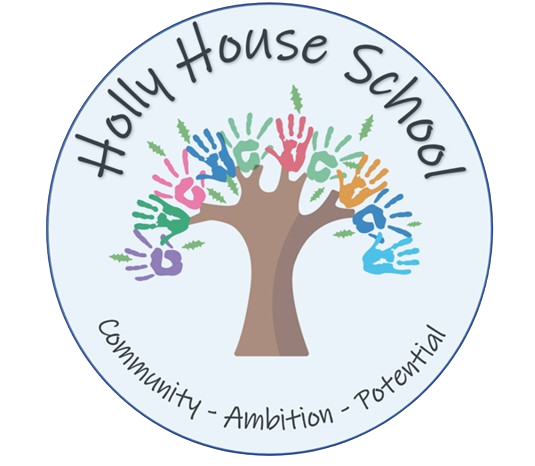Holly House School Curriculum
Our curriculum sets out to build knowledge and skills over time through a sequenced programme of learning that is adapted to meet the diverse needs of our pupils.
In delivering the curriculum we aim to achieves a careful balance between the need of our pupils, the time available and the important knowledge and skills that pupils need to learn. Our challenge is to ensure a broad, rich curriculum that also provides sufficient depth to enable a full grasp of concepts. Our curriculum is framed to support each child so their special educational needs are catered for. To do this we use adaption in teaching and delivery to ensuring an inclusive curriculum that enables full access for all. With these adjustments we hope to develop a love of learning in our pupils and a desire to reach their full potential.
When visiting our website and the Subject pages that make up our curriculum, you will find:
A vision – This outlines what we hope pupils will gain from their study within the subject while at Holly House school and beyond.
The intent – This expands on the vision and explains what we are aiming to provide our pupils and why. Subject leaders have carefully considered what it is their subject can offer each pupil.
The implementation – This is specific to the subject area and explains how we go about imparting and build the knowledge and skills pupils will need to gain over their time studying. The implementation will also outline how the delivery is adapted to make it accessible to all pupils
The impact - How a subject impacts on pupils is not only measured through formal assessment, but also how it is likely to positively change the future outcomes for that person and support them to flourish in the future, close the gaps and not be left behind.
To help in understanding what pupils learn at different points while at Holly House school we have also included:
The Subject Delivery Overview – This is a visual plan for each subject that shows how the curriculum is organised across the key stages and classes with in them. POD, Class 1 and Class 2 make up our Key Stage 2 offer. Class 3, Class 4 and Class 5 make up our Key Stage 3 offer.
The Subject Progression Map – This is a document that will help visitors to understand how the curriculum is organised into knowledge and skills that will be learnt at different points. These are organised into Key Stages and outcomes by school year group.
We are a community that builds ambition to achieve the potential of every pupil.
The Behavioural Curriculum:
Holly House is committed to creating an environment where exemplary behaviour is at the heart of productive learning and reflects our vision of a community that builds ambition to achieve potential.
We follow a whole-school approach to maintaining high standards of behaviour that reflect our core values of:
- Relationships
- Respect
- Responsibility
To build a community of learners who values kindness, care, good humour, good temper and empathy for others.
While it is important to set boundaries for all children’s safety, wellbeing, and success, applying rules too rigidly can unintentionally disadvantage neurodiverse children. These students may display behaviours that don’t always fit typical expectations, and enforcing uniform standards can overlook their unique needs. At Holly House, while we are not a school specialising specifically in Autism, many of our students are neurodivergent, often showing traits associated with autism. We strive to provide tailored support that meets their individual learning and behavioural profiles.
Our curriculum reflects this commitment: lessons are structured in 30-to-40-minute blocks, staff maintain a consistent approach, transitions are kept minimal, and there are safe, calming spaces available for pupils experiencing stress. Trusted staff members are always on hand, helping pupils build positive and supportive relationships.
The principle of Unconditional Positive Regard is central to our ethos. We believe that while a child’s behaviour may sometimes be challenging, the child themselves should never feel criticised or shamed. Instead, we view behaviour as a way for pupils to communicate their needs, anxieties, and emotions. By fostering strong relationships between pupils and staff and maintaining predictable routines, we help students learn to manage their behaviour and develop self-regulation skills.
Our school council plays an important role in shaping this positive environment. Pupils are actively involved in developing the school’s behaviour for learning policy: they review and approve our behaviour principles and work together to create a set of guidelines that reflect all students’ voices.


